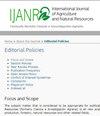智利农业水资源管理及其挑战
IF 0.5
4区 农林科学
Q3 AGRICULTURE, MULTIDISCIPLINARY
International Journal of Agriculture and Natural Resources
Pub Date : 2021-01-01
DOI:10.7764/ijanr.v48i3.2328
引用次数: 4
摘要
水是农业发展的战略资源,特别是在智利中部和北部的干旱和半干旱地区。目前,灌溉面积占该国农业GDP的60%至65%。随着智利的经济增长,总用水量增加,再加上人口增长、城市化、水污染和污染,导致了严重的水资源紧张局势,引发了更多的冲突和社会、经济和环境脆弱性。气候变化将加剧上述现象。目前,中北部地区存在覆盖灌溉需求的地表水亏缺。由于气候变化,这一赤字预计将增加,这将增加满足农业用水需求的挑战。本文的目的是全面回顾智利水和农业水管理政策的关键方面,考虑到它们的交互阶段,为读者提供该模式的主要特征的总体概述,评估其有效性和农业水管理面临的主要挑战。解决未来的挑战需要在智利整体水资源管理的更广泛背景下彻底重新考虑水管理政策和制度,以及如何在农业部门管理水。本文章由计算机程序翻译,如有差异,请以英文原文为准。
Management of Water Resources in Agriculture in Chile and its Challenges
Water is a strategic resource for agricultural development, particularly in the arid and semiarid regions of central and northern Chile. Currently, irrigated surfaces contribute between 60 and 65% of the country’s agricultural GDP. Associated with Chile’s economic growth, total consumptive water use has increased, which, together with population growth, urbanization, water contamination and pollution, has led to important water stress situations that are triggering a greater number of conflicts and social, economic, and environmental vulnerability. The above phenomena will be exacerbated by climate change. At present, surface water deficit covering irrigation demands exists in the central and northern regions. This deficit is projected to increase as a result of climate change, which would increase the challenges for satisfying agricultural water requirements. The objective of this article is to integrally review the key aspects of Chilean water and agricultural water management policies, considering their interphases, providing the reader with a general overview of the main features of this model, an evaluation of its effectiveness and the main challenges agricultural water management faces. Resolving the challenges of the future requires a thorough reconsideration of water management policies and institutions and how water is managed in the agricultural sector in the broader context of overall water resource management in Chile.
求助全文
通过发布文献求助,成功后即可免费获取论文全文。
去求助
来源期刊

International Journal of Agriculture and Natural Resources
AGRICULTURE, MULTIDISCIPLINARY-
CiteScore
2.40
自引率
0.00%
发文量
0
 求助内容:
求助内容: 应助结果提醒方式:
应助结果提醒方式:


